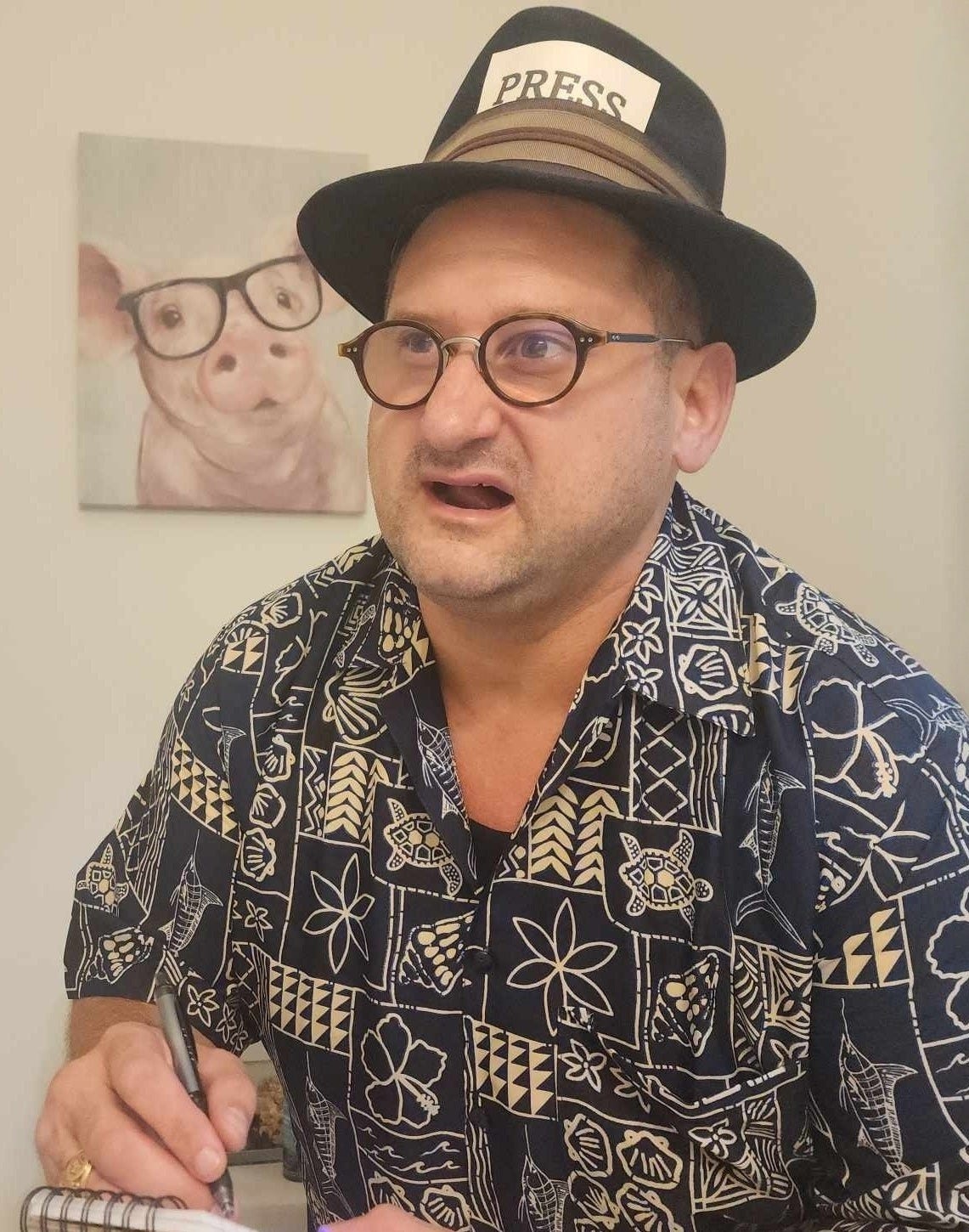Michael Volpe: “They’re saying she didn’t deny the cocaine test but that it was for a medical procedure, right?”
Richard Luthmann: “Exactly. That’s the excuse. They didn’t deny that she tested positive for cocaine. They said it was for a medical procedure or treatment. But let’s be honest: cocaine stopped being used for medical purposes decades ago. It’s laughable. Back in the days of Wyatt Earp, maybe, but not now.”
By Dick LaFontaine with Richard Luthmann
The custody battle between Feliza Castro and Edward Engels has taken another dramatic turn, as Castro, through her attorney Max Goodman of Amundsen Davis LLP, vehemently denied allegations made by Engels and threatened legal action against journalist Richard Luthmann, who published an article reporting the allegations drug use and child neglect contained in filed court documents.
Luthmann, a contributor to this outlet, provided comments and background on this article.
On October 12, 2024, an article written by Luthmann was published on Substack and other outlets, reciting Engel’s accusations of Castro engaging in drug use, livestreaming her behavior on Instagram and Facebook, and endangering the couple’s 11-year-old daughter.
The allegations were contained in filed court documents. Based on these claims, Engels’ latest emergency motion, filed on October 2, 2024, sought to suspend Castro’s parenting time. Engels provided the court with social media posts and alleged drug test failures, including positive results for cocaine and ketamine, to support his motion.
The legal pleadings expressly accuse Castro, in paragraph 30, of “failing nearly every drug test, the prior Court failed to enforce positive tests for: cocaine, ketamine, opiates, amphetamines, and smoking marijuana around the clock — all while taking bipolar medication.”
But Goodman, Castro’s attorney, categorically denied these and other allegations in a strongly worded letter sent to Luthmann on October 16, 2024. Goodman’s letter demanded that Luthmann immediately remove the article, issue a retraction, and cease any further defamatory statements about Castro.
“It was a clumsy attempt at a shakedown,” Luthmann said. “These idiots don’t know who they’re dealing with. To paraphrase Junior Soprano, they want me to take down an article; I want to f-ck Angie Dickinson. Let’s see who gets lucky first.”
Attorney Goodman’s Letter: “These Allegations Are Not True”
In his letter, Goodman accused Luthmann of defaming his client and misrepresenting the facts of the custody case. “Your article is defamatory and not shielded by any conceivable privilege or defense,” Goodman wrote. He outlined six specific claims from Luthmann’s article that he deemed false, including that Castro had an OnlyFans account, that she was a drug addict, that she had used drugs while caring for her daughter, and that she had submitted fraudulent medical records to the court to explain her positive drug tests. For completeness of the record, here is Attorney Goodman’s denial on behalf of his client, Feliza Castro:
1. That [Feliza Castro] has an OnlyFans account;
2. That [Feliza Castro] is a drug addict;
3. That [Feliza Castro] has used drugs while caring for her daughter;
4. That [Feliza Castro] has picked up her daughter from school while under the influence of illegal drugs;
5. That [Feliza Castro] criminally neglects her daughter; and
6. That [Feliza Castro] knowingly submitted fraudulent medical records to the court on multiple occasions.
“None of those allegations are true,” Goodman stated unequivocally, conceding that the statements were published as allegations contained in and/or reasonably related to the contents of filed court documents.
Goodman went on to criticize Luthmann for using hashtags like #OnlyFans, #DrugAddiction, and #CocaineScandal, which he argued were designed to sensationalize the story and attract clicks.
“To garner more clicks and views, you included defamatory hashtags about my client,” Goodman said.
Goodman’s letter also took issue with Luthmann’s inclusion of certain images in his article, particularly a stock photograph of a syringe and “heroin” that appeared at 0:41 in the accompanying video.
"In the video which appears above your article, you salaciously included stock photographs of what appears to be heroin and a syringe while accusing Ms. Castro of illegal drug use while with her daughter," Goodman wrote. [Note: Addiction experts warn that cocaine may also be injected by syringe.]
He further criticized Luthmann for including a photograph of Castro with her daughter, calling the inclusion "beyond comprehension" and accusing the journalist of putting the child in harm's way by spreading falsehoods.
“Your defamatory video then transitions to Ms. Castro at her (legal) cannabis business with your caption: ‘Can Feliza Castro Pass a Drug Test?’” Goodman noted, claiming that the caption was Luthmann’s invention and not part of the court filings.
However, the court filings are crystal clear. In paragraph 35, they claim Feliza Castro “has a long-standing history of drug use and addiction, extensively documented, and in the eleven years of Court involvement, she has passed only one drug test while strapped to a bed, as her withdrawals were so difficult.”
Questioning ‘Can Feliza Castro Pass a Drug Test?’ is a logical inference from the allegations in the court documents.
Threat of Legal Action: Defamation and Emotional Distress Claims
Goodman did not stop at demanding a retraction. His letter clarified that Castro was prepared to pursue civil litigation against Luthmann.
“To compensate my client for her losses, we have been authorized to pursue civil recourse against you under various theories including Defamation Per Se; False Light Invasion of Privacy; Intentional Infliction of Emotional Distress; and Civil Conspiracy,” Goodman wrote.
Goodman outlined the grounds for these claims, asserting that Luthmann had recklessly disregarded the truth.
"We will demonstrate that you knew your false statements concerning my client were false at the time they were published online; or alternatively, that you acted with reckless disregard for the truth of such statements," Goodman wrote.
He emphasized that Luthmann had no tangible or documentary evidence to support his claims and that no court or governing body had ever found Castro responsible for any criminal activity.
“You are (or were) an attorney. You know better,” Goodman added pointedly.
The letter also accused Luthmann of bad faith in his journalistic process, noting that he had emailed Castro’s lawyer mere hours before publication on Yom Kippur, giving no reasonable opportunity for response before going live with the story.
"You emailed her counsel only to say that you did. Your actions demonstrate bad faith," Goodman asserted.
Luthmann responded, “I’m sorry if I disturbed Beermann LLP’s ‘Tom Field-berg’ and ‘John D’Arco-witz’ on their ‘High Holy Days.’ I’m interested in learning about their religious rituals, likely consisting of Guinness and cannolis on the ninth green. Give me a break.”
Luthmann also insinuated that Attorney Goodman’s letter was “client window-dressing” with “no real legal legs.”
“I’ve heard about singing for your supper, but this is over the top. I guess lawyers are gonna lawyer, and shysters are gonna shyster. The press protections under Illinois law and elsewhere are abundantly clear. So are the anti-SLAPP laws.”
Luthmann seemed to be amused by the entire exercise.
“The weed business must be good if she’s got high-priced lawyers from The Loop on retainer. I hope she sues. Then, I’ll get her tax returns,” Luthmann said.
Luthmann’s Response: Standing by His Reporting
In response to Goodman’s letter, Luthmann fired back, defending his article as fair reporting based on credible sources. In an email to Goodman, Luthmann invoked the Illinois Reporter’s Privilege Statute, which grants journalists a qualified privilege to protect their sources from disclosure.
He made it clear that he had no intention of complying with Goodman’s demands to “give up” his sources.
“I recognize that you have a job to do,” Luthmann wrote. “But I only ask for the same respect. A journalist does not reveal their sources and cannot be compelled to do so in the State of Illinois unless the most extreme circumstances exist.”
Luthmann cited several Illinois cases that upheld journalists’ rights to protect their sources and indicated that he would not disclose any information about the materials he had received - from anyone - before publishing the article or since.
Luthmann also rejected the notion that his reporting was retaliatory, stating, "I am taking no ‘retaliatory steps’ when I engage in newsgathering, organization, and dissemination of information in the media, even if it happens to involve your client."
He noted that he had allowed Goodman’s client to comment before publication, but the lawyers from Beermann LLP had not responded in time or at all.
Asserting his rights under the First Amendment and Illinois' anti-SLAPP laws, which protect against frivolous lawsuits intended to silence free speech, Luthmann said he would continue to report the facts as he understood them.
“My obligations as a journalist are fulfilled,” he concluded, noting that he would include Goodman’s letter in a follow-up article.
Engels’ Court Filings: Drug Use Allegations and Social Media Evidence
Luthmann’s previous articles reported on the allegations made in Engel’s filed court documents.
Engels’ emergency motion, filed on October 2, 2024, paints a troubling picture of Castro’s behavior. He alleges that Castro has repeatedly failed drug tests, testing positive for cocaine, ketamine, and opioids, and claims that her drug use is evident in posts on her Instagram and Facebook accounts. According to the court papers, Engels provided screenshots and video clips of Castro allegedly engaging in drug use while their daughter was present in the home.
In the court papers, Engels has also accused Castro of submitting fraudulent medical records to explain away her positive cocaine test. The motion states that Castro, through her attorney, claimed the cocaine was administered during a nasal procedure. Still, Engels provided evidence showing that cocaine is no longer used in modern medical treatments.
Despite these claims, Judge Fernandez dismissed Engels' motion, citing his failure to cite the Illinois statute authorizing emergency motions properly.
Engels has since indicated that he will file another motion, this time based on new allegations of emotional abuse.
Luthmann and Volpe Dive Deep into Castro-Engels Custody Battle on The Unknown Podcast

In a recent episode of The Unknown Podcast, Luthmann and Chicago-based investigative journalist Michael Volpe discussed the ongoing custody battle between Feliza Castro and Edward Engels, with a particular focus on allegations of drug use and courtroom corruption. Luthmann shared insights into the claims and court filings that have raised eyebrows in Cook County.
The discussion began with Volpe asking about Castro’s behavior on social media, a central point in Engels’ court filings.
“You wrote an interesting article, ‘Cook County Judge Shocks in Custody Battle: Mom's Drug Use on Social Media Dismissed as No Emergency,’” Volpe said. “What sort of drug use is this woman talking about on social media?”
Luthmann explained the context: “First of all, she’s a marijuana marketer, and it’s legal in Illinois,” he said, acknowledging the legality of cannabis.
However, Luthmann pointed out that this wasn’t the main issue.
“Just because you sell weed in a dispensary doesn’t give you carte blanche in drugs,” Luthmann remarked. “The bigger issue is that Engels, in court documents, has alleged she’s not just using marijuana, but harder drugs like ketamine and cocaine. The claim is that she failed a drug test for cocaine, and it was covered up by court personnel, including the guardian ad litem.”
Volpe responded with disbelief, particularly about the claim that cocaine use was being excused for medical reasons.
“They didn’t deny that she tested positive for cocaine. They said it was being used for a medical procedure,” Luthmann elaborated. “But cocaine stopped being used for medical treatment back in the days of Wyatt Earp,” he added humorously.
Volpe chimed in, labeling the explanation “completely ludicrous.”
He then shifted focus to Beermann LLP, which represents Castro, and its alleged role in courtroom irregularities.
THE CHILDREN ARE COMING: Chicago Family Court’s Dark World Exposed - A Sham 'BLM Scholarship,' Child Sexual Abuse, and Judicial Corruption
NOTE: Thanks to Michael Volpe for alerting me about this heinous story of Chicago Family Court corruption and child sexual abuse.
"Part of your subheader says Beermann LLP and alleged corruption in the courtroom,” Volpe noted. “Beermann has been sued under the RICO statute, and the allegations are that they’re bribing judges and other court officials. Is that the claim in this case?"
Luthmann didn’t confirm outright bribery in Castro’s case but noted the cozy relationships at play.
“There’s definitely something irregular here,” Luthmann said. “Every time I mention Beermann, I get attacked online by sock puppet accounts. It shows we’re doing something right—it’s clear we’re getting under their skin.”
Volpe then referenced his own investigative work, pointing to Dr. David Finn’s involvement in the case. According to Volpe, Finn's evaluation played a critical role in the decision to grant Castro primary custody despite Engels’ concerns about her drug use.
"Dr. David Finn found so-called parental alienation on Eddie’s part and recommended Feliza get sole custody,” Volpe explained. “Finn has been involved in multiple cases with Beermann clients, all of which ended in favorable outcomes for Beermann. This isn’t just a coincidence.”
Luthmann then brought up a message from Castro herself, responding to his coverage of the case.
“For the completeness of the story, she reached out to me on Instagram and said, ‘I never failed drug tests for cocaine or ketamine,’ which obviously contradicts the court documents Engels has filed,” Luthmann stated. He read Castro’s entire message:
“I never failed drug tests for cocaine or ketamine. You are out here defending a man who has terrorized our lives for over a decade. I will let my attorneys take over from here but felt I should reach out myself first. You are an awful human being for publishing this at all, but especially without the facts. Disparaging me is the same as disparaging my daughter.”
Volpe noted how such statements can be common in contentious cases.
“The problem is that both victims and abusers would say something like that,” he remarked.
Volpe added that Castro’s legal actions raise questions.
“She sued Eddie for defamation. She seems to be lawsuit-happy, and that’s not a compliment.”
The conversation underscored how the Engels-Castro case, embroiled in allegations of drug use, courtroom manipulation, and defamation claims, has drawn attention to possible misconduct in Cook County's legal system. Luthmann and Volpe suggested that deeper investigations are needed to uncover the truth behind these serious accusations.
The Battle Continues
As the custody battle between Engels and Castro intensifies, both sides are gearing up for what could be a protracted legal fight. While Engels seeks to protect his daughter by suspending Castro’s parenting time, Castro, through her attorney, is preparing to defend her reputation against what she calls “false and defamatory” allegations.
And Luthmann, caught in the crossfire, remains steadfast in his reporting.
With legal threats looming, new motions on the horizon, and a journalist being hit with a lawyer “shakedown letter,” this case is far from over.


























Share this post